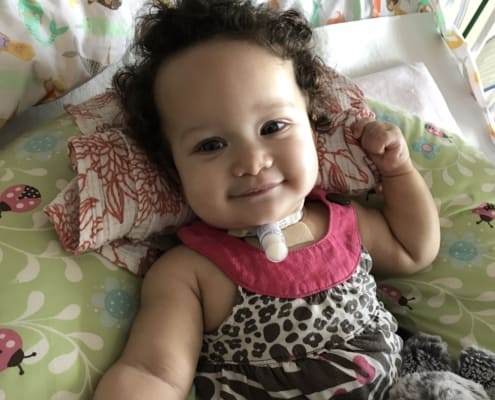In Conversation: A Parent Perspective on AFM
July is Acute Flaccid Myelitis (AFM) Awareness Month. Throughout the month, we invite you to learn and share about AFM so that others will know about this rare neuroimmune condition. We recently connected with Gretchen Trimble, a parent whose daughter has AFM, read below to learn more about her story.
What is your connection to AFM?
Our daughter, Opal Rose, was diagnosed with AFM at 4 months old in March 2019. The diagnosis changed our lives. We had never heard of AFM prior to her diagnosis, and it has been a learning experience since that day. Each season with AFM presents new challenges and things to consider. Three and a half years post diagnosis, and it continues to be a learning experience.
What has been difficult about your experience with AFM?
Trying to understand a diagnosis we had never heard of before and coming to terms with how much this diagnosis has affected and will impact our daughter’s life (and family’s). Watching our daughter suffer in the beginning and, for a while, fight for her life was excruciating. Though Opal has recovered well, she still faces extreme mobility issues because of AFM. As her mom, watching her encounter limitations, like not being able to play on the playground or run and play outside, can be heart-wrenching.
What have you learned about yourself throughout this process?
I’ve learned I’m a lot stronger and more capable than I gave myself credit for. Initially, AFM was life-threatening for our (at the time) four-month daughter. In the past three years since diagnosis, I have felt like a nurse, therapist, researcher, insurance specialist, and most importantly, my daughter’s number one advocate. In our most weary moments, giving up has never been an option. We just keep going forward in the best interest of our daughter.
Who has supported you on this AFM journey?
So many people have supported us, encouraged us, and loved us on this very difficult journey. Grandma, aunt, and other precious family members; our wonderful church family; and so many people from our community. We’ve also had so much support and love from strangers across the country (and world) who have taken an interest in our daughter and her journey. This has been a beautiful part of a very difficult journey.
What challenges have you faced throughout your journey with AFM?
There have been so many challenges of varying degrees. Because AFM is so rare and not known, there have been many challenges related to getting insurance approvals, needing to jump extra hurdles with letters of medical necessity, routine assessments, and more. We have had to share her journey often with doctors, therapists, insurance companies, and others to get her the proper care and resources she needs. Also, one of our challenges, as she has gotten bigger, is how to help her integrate into life with peers and others in different environments. Initially, with a tracheostomy, caretaking itself was a huge challenge – demanding and tiring. And trying to help her brother and sister learn how to have conversations with their peers and others about their sister’s diagnosis and how it has impacted their sister’s life and abilities has been a challenging process.
Is there anything that encourages you?
How God has used the love, prayers, and support of so many people to encourage us on this journey. Our hearts have been forever changed by the kindness and generosity of people, both known and strangers. In a very trying season in life, I know we would not have fared nearly as well without this kind of community and support. And most importantly, we are encouraged by the improvements she continues to make, no matter how big or small. We have learned to celebrate so many things we used to take for granted. We now count our blessings in an entirely new (and so much more humbling) way.
We are grateful to Gretchen and her family for sharing a small part of their story of AFM with us. If you would like to share your story, consider adding a video to our This Is Me campaign or writing a submission for the SRNA Blog.
Our “In Their Own Words” blog posts represent the views of the author of the blog post and do not necessarily represent the views of SRNA.





